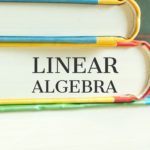Quiz 1. Gauss-Jordan Elimination / Homogeneous System. Math 2568 Spring 2017.

Problem 262
(a) Solve the following system by transforming the augmented matrix to reduced echelon form (Gauss-Jordan elimination). Indicate the elementary row operations you performed.
\begin{align*}
x_1+x_2-x_5&=1\\
x_2+2x_3+x_4+3x_5&=1\\
x_1-x_3+x_4+x_5&=0
\end{align*}
(b) Determine all possibilities for the solution set of a homogeneous system of $2$ equations in $2$ unknowns that has a solution $x_1=1, x_2=5$.
Sponsored Links
Contents
Solution.
(a) Solve the following system by Gauss-Jordan elimination
The augmented matrix of the system is
\[ \left[\begin{array}{rrrrr|r}
1 & 1 & 0 & 0 &-1 & 1 \\
0 & 1 & 2 & 1 & 3 & 1 \\
1 & 0 & -1 & 1 & 1 & 0 \\
\end{array} \right].\]
We apply elementary row operations as follows.
\begin{align*}
\left[\begin{array}{rrrrr|r}
1 & 1 & 0 & 0 &-1 & 1 \\
0 & 1 & 2 & 1 & 3 & 1 \\
1 & 0 & -1 & 1 & 1 & 0 \\
\end{array} \right]
\xrightarrow{R_3-R_1}
\left[\begin{array}{rrrrr|r}
1 & 1 & 0 & 0 &-1 & 1 \\
0 & 1 & 2 & 1 & 3 & 1 \\
0 & -1 & -1 & 1 & 2 & -1 \\
\end{array} \right]
\xrightarrow{\substack{R_1-R_2\\ R_3+R_2}}\\[6pt]
\left[\begin{array}{rrrrr|r}
1 & 0 & -2 & -1 &-4 & 0 \\
0 & 1 & 2 & 1 & 3 & 1 \\
0 & 0 & 1 & 2 & 5 & 0 \\
\end{array} \right]
\xrightarrow{\substack{R_1+2R_3\\ R_2-2R_3}}
\left[\begin{array}{rrrrr|r}
1 & 0 & 0 & 3 & 6 & 0 \\
0 & 1 & 0 & -3 & -7 & 1 \\
0 & 0 & 1 & 2 & 5 & 0 \\
\end{array} \right].
\end{align*}
The last matrix is in reduced row echelon form.
The unknowns $x_1, x_2, x_3$ correspond to the leading $1$’s. Thus they are dependent variables and $x_4$ and $x_5$ are independent (free) variables.
From the last matrix, we see that the solution set is given by
\begin{align*}
x_1&=-3x_4-6x_5\\
x_2&=3x_4+7x_5+1\\
x_3&=-2x_4-5x_5
\end{align*}
for any numbers $x_4, x_5$.
(b) Determine all possibilities for the solution set of a homogeneous system
A homogeneous system is always consistent because it has the zero solution $x_1=0, x_2=0$.
So, we already know the possibilities for the solution set are either a unique solution or infinitely many solutions.
Note that the homogeneous system we are inspecting has a solution $x_1=1, x_2=5$, which is different from the zero solution $x_1=0, x_2=0$. Thus, the homogeneous system has at least two solutions.
Thus, the only possibility is that the homogeneous system has infinitely many solutions.
Comment.
These are Quiz 1 problems for Math 2568 (Introduction to Linear Algebra) at OSU in Spring 2017.
List of Quiz Problems of Linear Algebra (Math 2568) at OSU in Spring 2017
There were 13 weekly quizzes. Here is the list of links to the quiz problems and solutions.
- Quiz 1. Gauss-Jordan elimination / homogeneous system.
- Quiz 2. The vector form for the general solution / Transpose matrices.
- Quiz 3. Condition that vectors are linearly dependent/ orthogonal vectors are linearly independent
- Quiz 4. Inverse matrix/ Nonsingular matrix satisfying a relation
- Quiz 5. Example and non-example of subspaces in 3-dimensional space
- Quiz 6. Determine vectors in null space, range / Find a basis of null space
- Quiz 7. Find a basis of the range, rank, and nullity of a matrix
- Quiz 8. Determine subsets are subspaces: functions taking integer values / set of skew-symmetric matrices
- Quiz 9. Find a basis of the subspace spanned by four matrices
- Quiz 10. Find orthogonal basis / Find value of linear transformation
- Quiz 11. Find eigenvalues and eigenvectors/ Properties of determinants
- Quiz 12. Find eigenvalues and their algebraic and geometric multiplicities
- Quiz 13 (Part 1). Diagonalize a matrix.
- Quiz 13 (Part 2). Find eigenvalues and eigenvectors of a special matrix
 Add to solve later
Add to solve later
Sponsored Links














12 Responses
[…] Quiz 1. Gauss-Jordan elimination / homogeneous system. […]
[…] Quiz 1. Gauss-Jordan elimination / homogeneous system. […]
[…] Quiz 1. Gauss-Jordan elimination / homogeneous system. […]
[…] Quiz 1. Gauss-Jordan elimination / homogeneous system. […]
[…] Quiz 1. Gauss-Jordan elimination / homogeneous system. […]
[…] Quiz 1. Gauss-Jordan elimination / homogeneous system. […]
[…] Quiz 1. Gauss-Jordan elimination / homogeneous system. […]
[…] Quiz 1. Gauss-Jordan elimination / homogeneous system. […]
[…] Quiz 1. Gauss-Jordan elimination / homogeneous system. […]
[…] Quiz 1. Gauss-Jordan elimination / homogeneous system. […]
[…] Quiz 1. Gauss-Jordan elimination / homogeneous system. […]
[…] Quiz 1. Gauss-Jordan elimination / homogeneous system. […]